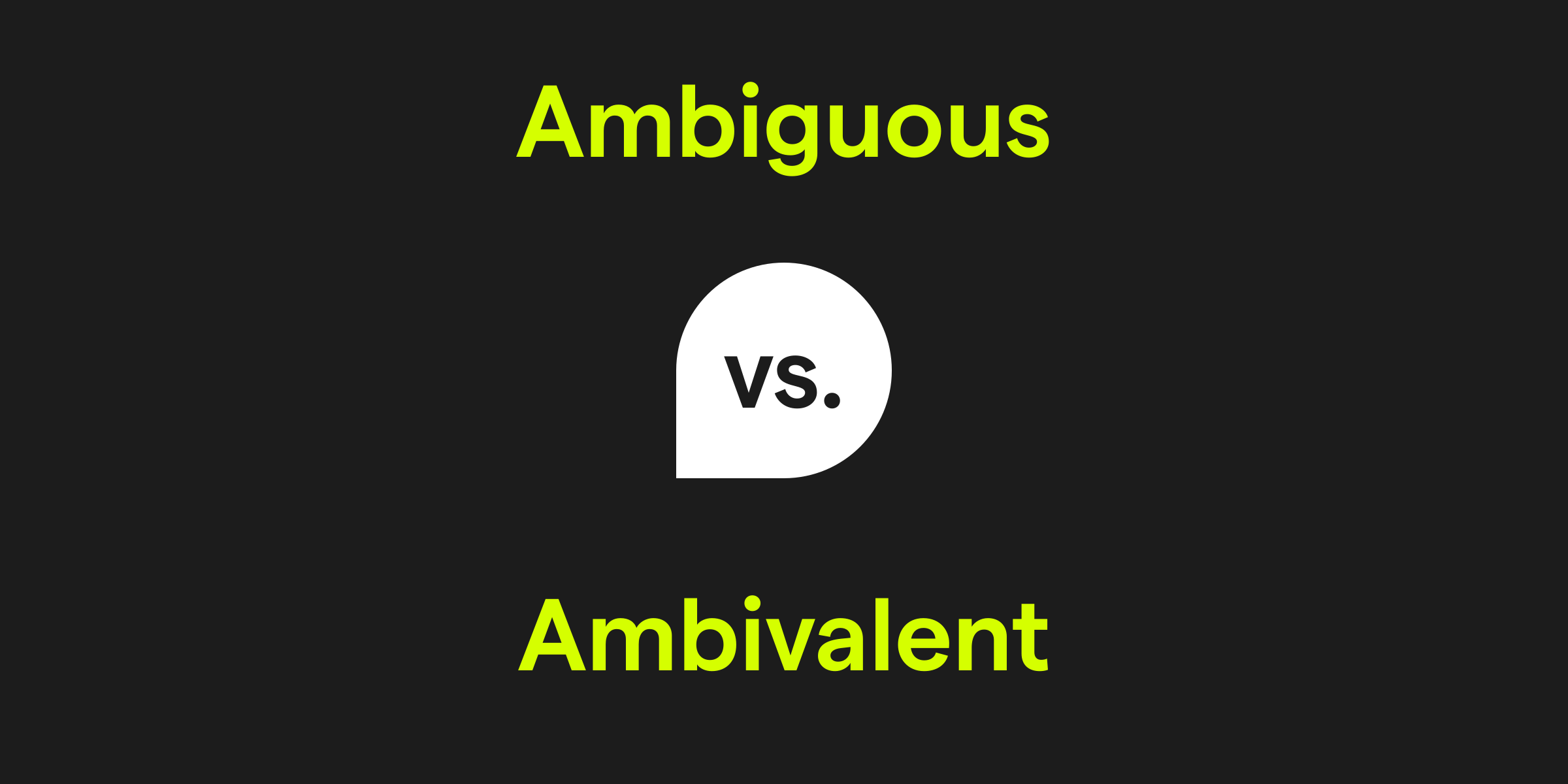Ambiguous vs. Ambivalent: What's the Difference?
Ambiguous and ambivalent are two words that can easily be confused but have distinct meanings. Ambiguous refers to something that is unclear, open to more than one interpretation, or lacking in clarity so that it can be understood in multiple ways. In contrast, ambivalent describes a state of having mixed feelings or contradictory ideas about something or someone.

How do you use the word ambiguous in a sentence?
The word ambiguous is often used when there is a lack of clarity or definite interpretation in a situation. It's employed to describe statements, instructions, or situations that are not clear, potentially leading to confusion or multiple understandings.
Examples of ambiguous in a sentence
- The ending of the movie was intentionally ambiguous, leaving the audience to draw their own conclusions.
- Her ambiguous reply made it difficult to understand her true intentions.
- The instructions were ambiguous and caused confusion among the team members.
How do you use the word ambivalent in a sentence?
Use ambivalent to describe a person's simultaneous and conflicting reactions to someone or something. It is a term that conveys the experience of having opposing attitudes or emotions at the same time, such as love and hate.
Examples of ambivalent in a sentence
- She felt ambivalent about the promotion because it meant more responsibility but less time with her family.
- His ambivalent feelings toward his boss were due to her supportive yet demanding nature.
- Despite the attractive job offer, he was ambivalent about relocating to a new city.
Ambiguous and ambivalent definition, parts of speech, and pronunciation
Ambiguous definition:
Ambiguous is an adjective used to describe something that can be understood in more than one way or is not expressed clearly. It implies uncertainty or an ability to have multiple interpretations.
Ambiguous parts of speech:
Ambiguous pronunciation:
The word ambiguous is pronounced as /amˈbɪɡ.ju.əs/.
Ambivalent definition:
Ambivalent is an adjective describing when someone has mixed feelings or contradictory attitudes about something or someone.
Ambivalent parts of speech:
Ambivalent pronunciation:
The word ambivalent is pronounced as /æmˈbɪv.ə.lənt/.
Ambiguous is an adjective used to describe something that can be understood in more than one way or is not expressed clearly. It implies uncertainty or an ability to have multiple interpretations.
Ambiguous parts of speech:
- As an adjective: The ambiguous phrase puzzled the listeners.
Ambiguous pronunciation:
The word ambiguous is pronounced as /amˈbɪɡ.ju.əs/.
Ambivalent definition:
Ambivalent is an adjective describing when someone has mixed feelings or contradictory attitudes about something or someone.
Ambivalent parts of speech:
- As an adjective: He has an ambivalent relationship with his fame.
Ambivalent pronunciation:
The word ambivalent is pronounced as /æmˈbɪv.ə.lənt/.
Ambiguous vs. Ambivalent in a nutshell
Ambiguous relates to a lack of specificity or clarity in communication, leaving room for multiple interpretations. Ambivalent, on the other hand, is about the coexistence of opposing emotions or thoughts within an individual toward a particular entity. Both terms deal with uncertainty, but one pertains to external expressions that can be interpreted in various ways, and the other relates to an internal state of conflicted feelings.
Get AI Writing Assistance Wherever You Type
Make sure your vocabulary is on point and every punctuation mark is in the right place, no matter where you’re working. Grammarly works across more than 1 million websites and apps so you can improve your writing without copying, pasting, or breaking focus.

More Commonly Confused Words
Interest piqued? Pore (not pour) over other commonly confused words to help your writing reach peak (not peek) performance.